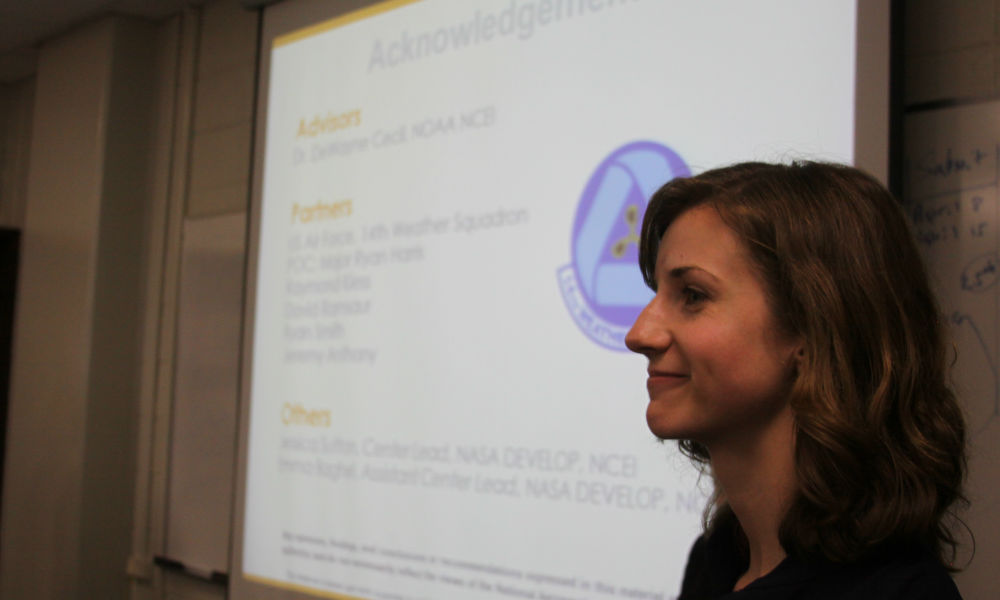Alumni spotlight: Christie Stevens
College of Integrated Science and Engineering
SUMMARY: Christie Stevens ('15) credits the Geographic Science Program for preparing her for the opportunity at DEVELOP with "an atmosphere of well-rounded, holistic thinking from a geographical perspective that offered opportunities for technical creativity."
By: Stephen Roddewig
During the spring of 2016, Christie Stevens, (’15) participated in DEVELOP, one of three capacity building programs in NASA’s Applied Science Program. According to the program’s website, NASA DEVELOP’s goal is to shape “the future by integrating Earth observations into global ‘decision making.’”
Located in the regional DEVELOP office in Asheville, North Carolina, Stevens worked with two other participants to examine vegetation conditions in the Levant and Central America. The team utilized satellite data to assess precipitation and drought levels in the regions during a 100-week term. “It was a more complex project requiring much flexibility,” said Stevens, “where we worked with a partner organization, the U.S. Air Force 14th Weather Squadron.”
At the conclusion of the project, the team produced a variety of deliverables such as an extensive technical paper and project video detailing their findings. “The Air Force 14th Weather Squadron will incorporate our data into their current drought monitoring tool,” explained Stevens.
A double Duke, Stevens graduated with a Bachelor of Science in Geographic Science (GS) with a concentration in Environmental Conservation, Sustainability and Development; and a Bachelor of Arts in Theatre and Dance. The GS program prepared her for the opportunity at DEVELOP with “an atmosphere of well-rounded, holistic thinking from a geographical perspective that offered opportunities for technical creativity.” According to Stevens, the creative skills, problem-solving experience, and technical knowledge reinforced her skills as a DEVELOP team member.
Her favorite classes included those that combined the technical aspects of geographic science, such as remote sensing, with the human geography field. “The GIS for Humanitarian Assistance course is a prime example of this intersection of technical and human-environment-interaction topics,” said Stevens. She also found that core courses such as Physical Geography and Human-Environment Interactions helped her develop scientific research skills, which she heavily utilized during her DEVELOP project.
Given her recent success, Stevens reflected on the internship search and the application process. “The most important skill is confidence,” Stevens said. In the highly competitive environment of DEVELOP, Stevens learned the best strategy was to “pick a direction and go.” Many students fear they have not prepared enough, but certainty matters most, according to Stevens. “It is incredibly important to be bold with whatever you choose to do, whether it be an internship or a job.”
Returning for a second term with DEVELOP, Stevens shares her enthusiasm over the opportunity to “study under such brilliant minds” and her admiration of “the drive, passion, and focus that fills the halls of the Asheville office.” According to Stevens, the greatest value of her experience was the sense of self and direction she gained. “I have a greater understanding of what gets me up in the morning, what gets my blood pumping, and the kind of work environment I see myself in for the future.”
